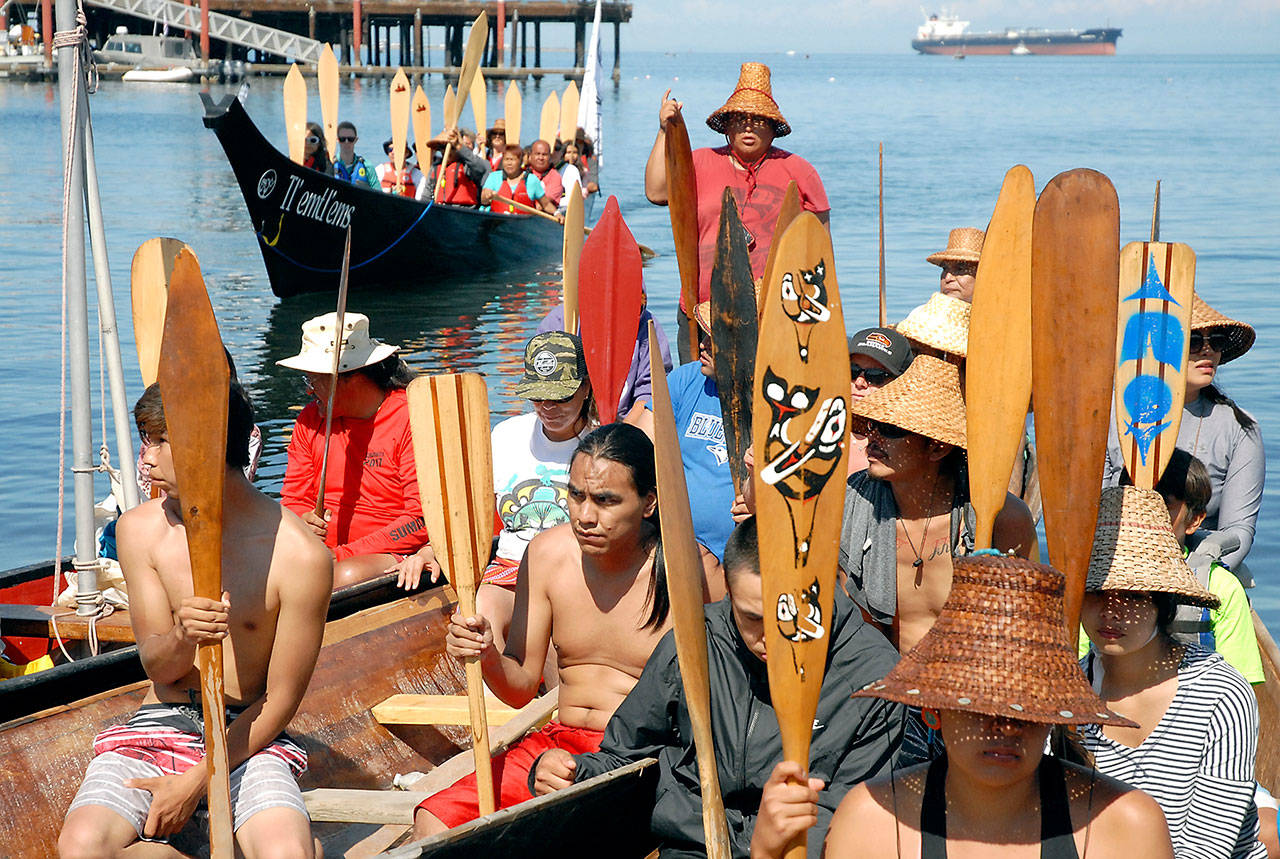PORT ANGELES — Weary pullers were greeted with smiles and warm Lower Elwha Klallam hospitality Friday as the Tribal Canoe Journey arrived in Port Angeles.
Twenty-two canoe teams landed on at Hollywood Beach for a two-day celebration of Native culture at the midway point in the 2018 Paddle to Puyallup.
As part of the landing protocol, a representative of each visiting tribe or Canadian First Nation asked a member of the Lower Elwha Klallam Tribe for permission to come ashore.
“Honored friends and relatives, we are glad you are here,” 11-year-old Malena Marquez said during one of the landings.
“Come ashore! Come ashore!”
More than half of the canoes that arrived Friday were powered by pullers who had crossed the Strait of Juan de Fuca from Beecher Bay.
“The conditions were great today,” said Thor Gauti of the T’Sou-Ke First Nation.
“Sometimes they can be really, really bad out there. But the last few times we’ve crossed, it’s been really nice.”
The Lower Elwha Klallam Tribe hosted the visiting tribes from the Washington coast and Vancouver Island for two days of singing, dancing and storytelling.
“Come share supper with us at Elwha,” Harmony Awakawa said as another canoe family waited for permission to land.
“We’ll sing and dance.
“Come ashore!”
The canoes were scheduled to leave Port Angeles today for their next stop at Jamestown Beach near Sequim to be welcomed by the Jamestown S’Klallam Tribe. The pullers planned to leave Jamestown and arrive at Fort Worden State Park in Port Townsend to be greeted by the area’s Klallam tribes on Monday.
Exact times of arrival are not possible as they are determined by the tides and winds.
A week-long protocol celebration for the 2018 Tribal Canoe Journey will be held in Puyallup beginning Saturday. More than 100 canoe teams from the Pacific Northwest and Canada were registered for the culminating event.
Norbert Sylvester of Cowichan crossed the Strait of Juan de Fuca on Friday with members of other first nations. He said there was a slight breeze on the Strait and manageable five-foot swells.
“It was pretty well smooth sailing,” said Sylvester, who spotted otters during the crossing.
“Wish we had a wind sail, though.”
The Lower Elwha Klallam Tribe provided water and a first-aid tent for the exhausted pullers. Volunteers helped the teams lift the Native canoes stern-first above the high tide line.
The Elwha’s own canoe, Beautiful Sister, is named in memory of Vanna Francis, a tribal member who died in 2007 at age 17.
Harry Moon of Wakeman Sound, B.C., carried a pink flag from the Lower Elwha Klallam Tribe to promote cancer awareness and support for cancer survivors.
Moon, whose Quinault-carved canoe was the first to arrive at Hollywood Beach, has been encouraging cancer survivors and cancer supporters at each stop on the way to Puyallup.
“We sit down and share our story,” said Moon, who lost his father and grandfather to cancer.
“Since Nanaimo, we sat there every night talking to supporters, talking to cancer survivors. I’m a cancer survivor myself. That’s the reason I carry the flag.”
The Tribal Canoe Journey travels to a different host tribe each year. The inter-tribal event began in 1989 as the “Paddle to Seattle” to mark the state’s centennial.
Moon has participated in the canoe journey every year since 1992 and has attended celebrations at the Lower Elwha Klallam Tribe every year since 2001.
The Tribal Canoe Journey began as a way to promote drug- and alcohol-free lifestyles and expanded to a cultural celebration in 1999, Moon said.
The canoe journey has reconnected long-lost relatives and teaches valuable life lessons to youth, Moon said.
“It’s reconciliation,” Moon said. “It’s bringing back not just the family ties, but helping our children learn to respect each other as well as themselves.”
________
Reporter Rob Ollikainen can be reached at 360-452-2345, ext. 56450, or at rollikainen@peninsuladailynews.com.

